You can't give your cat a kidney. I checked.
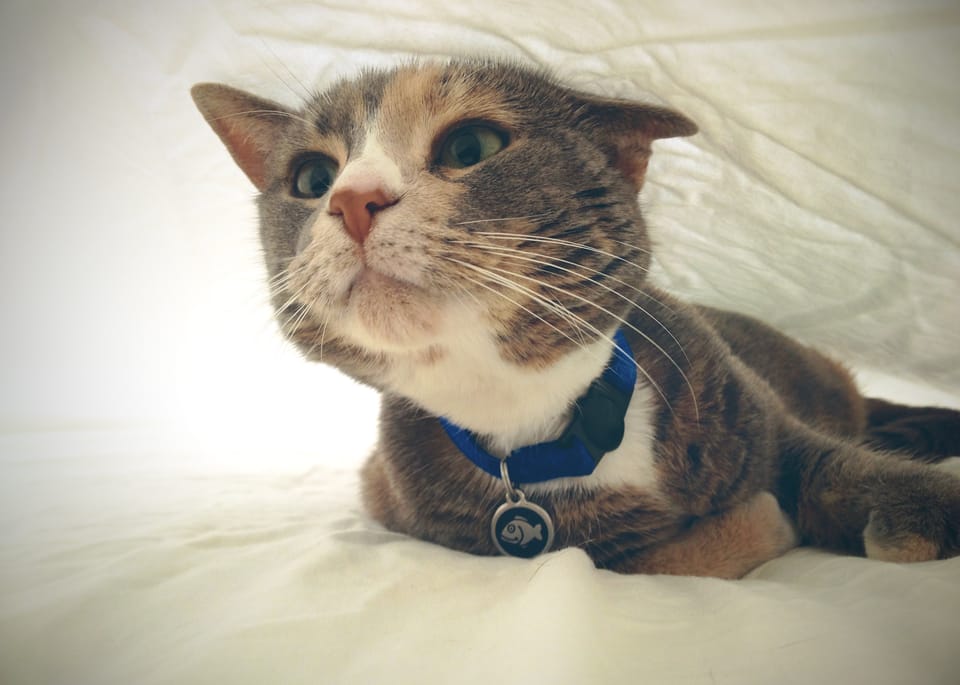
Just about 16 years ago, my partner wanted to get a cat. I was skeptical. There would be cat hair everywhere, I feared, and scratched-up furniture and probably far more shit and piss and vomit than I thought there ought to be in a small loft apartment. I didn’t see the upside, and the downside was … gross.
I thought back to all that Thursday morning as I sat on our bedroom floor with a cat on my lap, hoping desperately she would take the easy way and just do what she had to do on my legs instead of trying to drag herself to her litter box. I thought about how, in all of those downsides I had been worried about, I had never considered the greatest downside of all: the pit of despair that I was about to fall into, or perhaps already had.
Well, how did we get here?
It started with a memo. My then-partner/now-wife wanted a cat; I did not. I had concerns; I asked her to look into them.1 Then I realized if we got a cat we could name it Catlong, after the protagonist of “Kitty’s Back.”
That — along with the memo — led to a visit to the Humane Society one day in early 2008, where we met several cats, a couple of whom seemed like potential fits for us. And then we met a cat (quite unfortunately) going by the name “Precious,”2 and I swear I heard the opening bars of a Crystals song.3 Took about three seconds for that cat and I to fall in love, and for me to know she was Catlong.4
Our place in DC, the first real home Catlong knew, was this open loft with high ceilings and lots of beams and railings for her to climb and lounge on. When she was young she would hop up on a narrow railing, probably about 16 or 17 feet above a hard tile floor, and chase her tail around the railing.
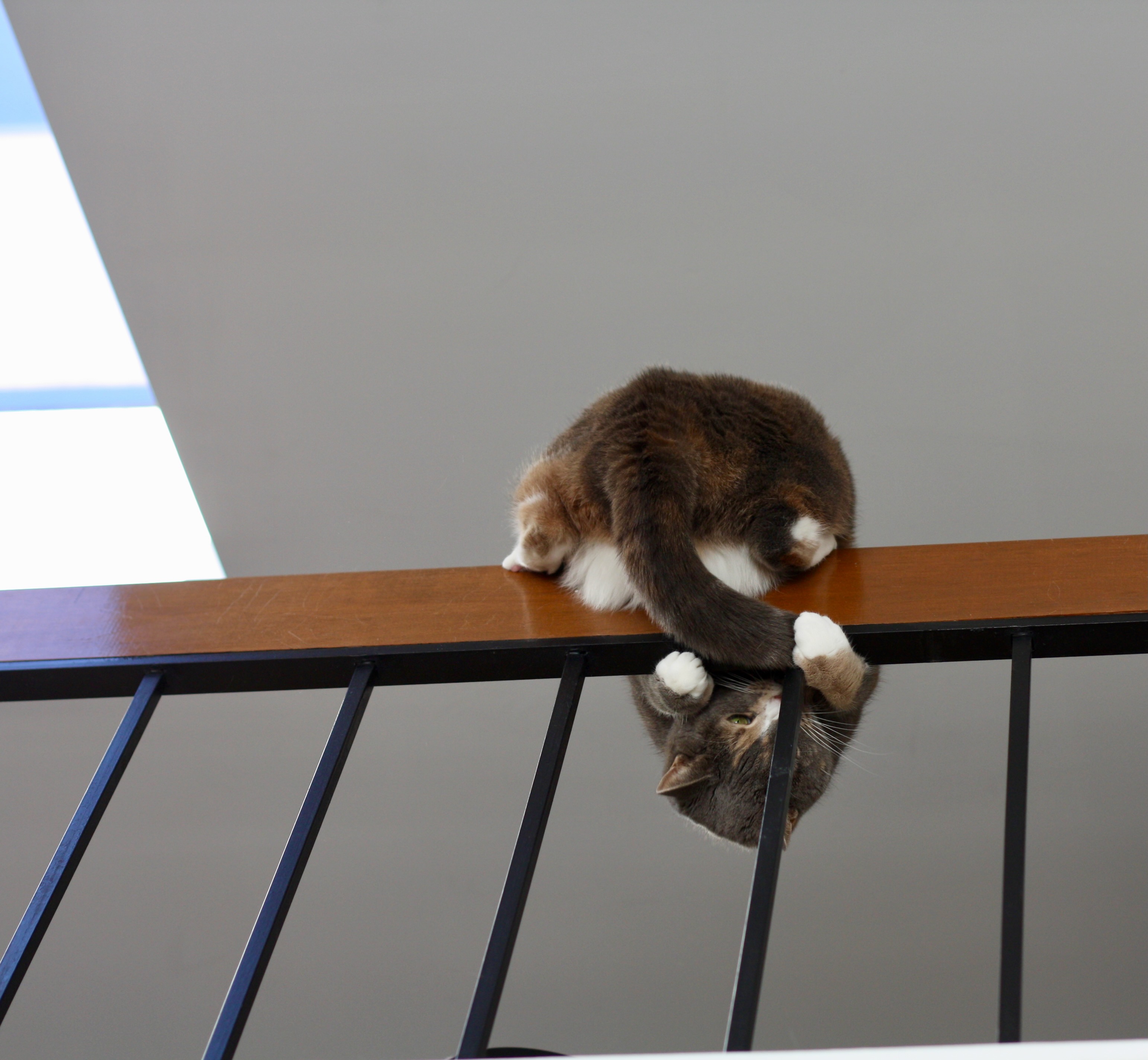
This did not strike me as a good idea, but I respected it. I was also sure she would fall some day. And then one day she did. She landed hard on the floor about three feet from me, bounced up, and immediately ran to a far corner of the apartment to check herself out. Satisfied nothing was broken, she soon emerged to hop up on my lap, looking perhaps a bit embarrassed but not at all dissuaded from further similar adventures. She would fall from that railing again, at least two more times, but each time she got up again, body and spirit both unbroken. She had a quick, deep resilience I admired.
In early 2008, a month or two after Catlong joined us, I didn’t feel well for a few weeks but couldn’t figure out what was wrong. Neither could my doctor. I stayed home from work one day and lay in bed, feeling unwell (both physically and not.) Soon Catlong came to me, no doubt wanting to play — that’s what she did then, pretty much all the time. But she seemed to immediately sense that this wasn’t the time for laser pointers or hide-and-seek. She looked at me briefly then curled up beside me, where she stayed for hours, purring steadily, until finally I felt a little bit better.
That was when I began to realize Catlong would be more important than I previously imagined possible.
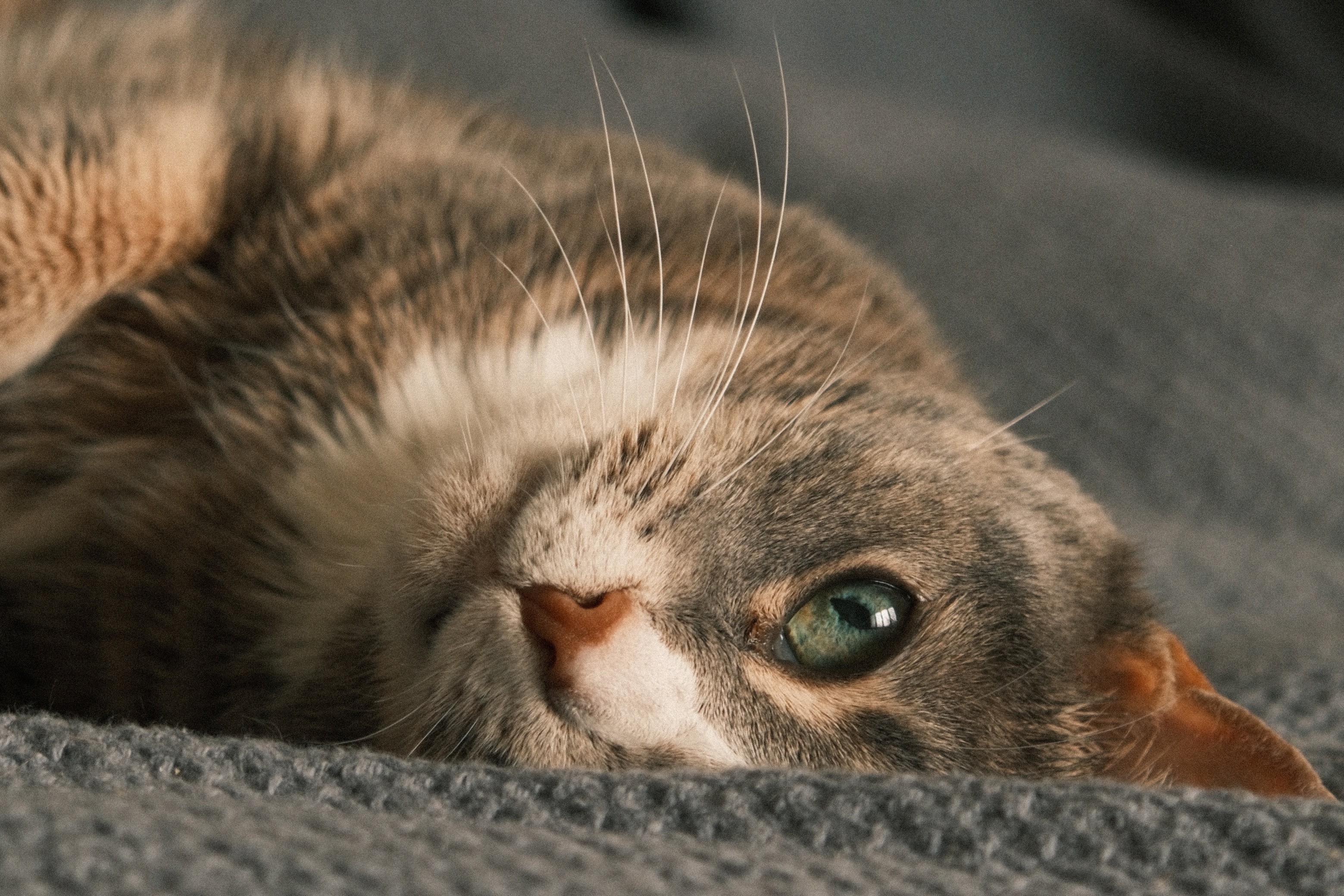
Catlong made me happier, and she made me a better person. On days when I didn’t like myself very much, she did. When I was mad or frustrated with myself, she wasn’t. She’d help me stop beating myself up, just by being so relentlessly and unconditionally loving. And that gave me space to focus on being better — to myself, to others5 — instead of just obsessing over whatever I’d done badly. I am, by both nature and profession, a critic — and I often turn those tendencies on myself. Catlong never did. She was accepting, and forgiving. I needed that as a reminder to take it a little easier on myself and on others.
I spend much of my time in some pretty dark spaces, intellectually and emotionally. For a quarter century or so I’ve been obsessed with and tried to sound the alarm about things like the corrosive effects on society and democracy of a media ecosystem in the hands of the feckless and malevolent; the structural rigging of our government and elections; the open assault on the very concepts of truth and reason by a band of anti-democratic thugs; a resurgent white supremacist movement; and rapidly worsening odds of large scale political violence. Oh, and climate change. This is not an easy way to go through your days.6 As my officemate for most of the last 15 years, Catlong made it a little more tolerable. I mean, come on:
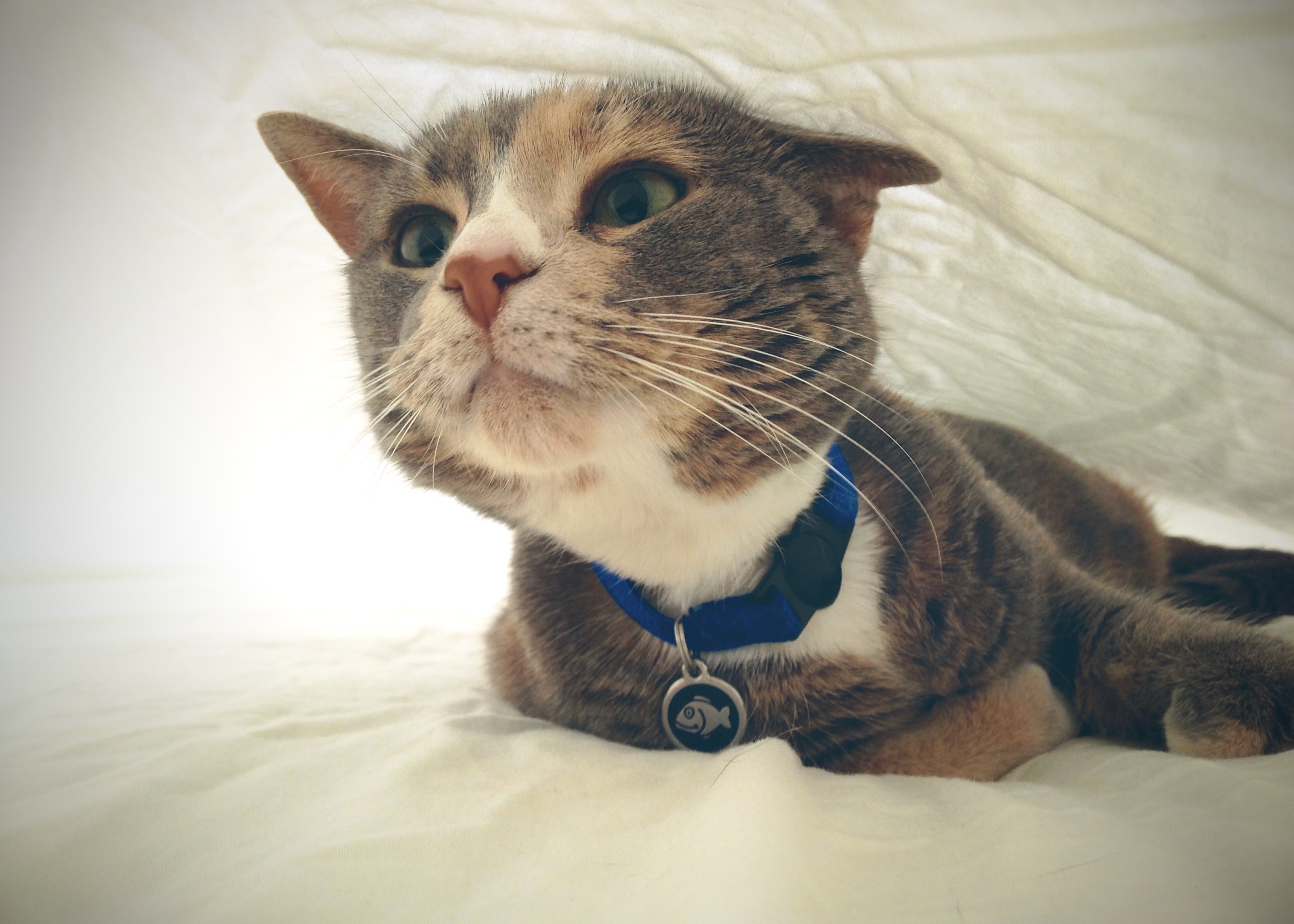
She gave me an calmness and peace I’d never known before, and that I eventually learned to seek elsewhere.7 She rekindled my love of animals and interest in the outdoors, both dormant since my youth. That led to frequent visits to the otters at the National Zoo, to long walks and longer hikes, and eventually contributed to our decision to move to the West Coast.
When we took Catlong to the vet for her annual checkup one Friday in early July we were a little concerned she had lost a bit of weight recently, but didn’t think too much of it; she seemed happy and playful and energetic and basically just herself. A week later, to the day, the vet told us we would probably need to say goodbye to Catlong within 24, maybe 48 hours. In between there were test results that suggested kidney disease, two ultrasounds that indicated a possible tumor, several days of sudden and intense lethargy (likely triggered — or at least intensified — by an adverse reaction to a sedative given for the first ultrasound, though we didn’t know that at first), other, scarier symptoms, and four days of this:
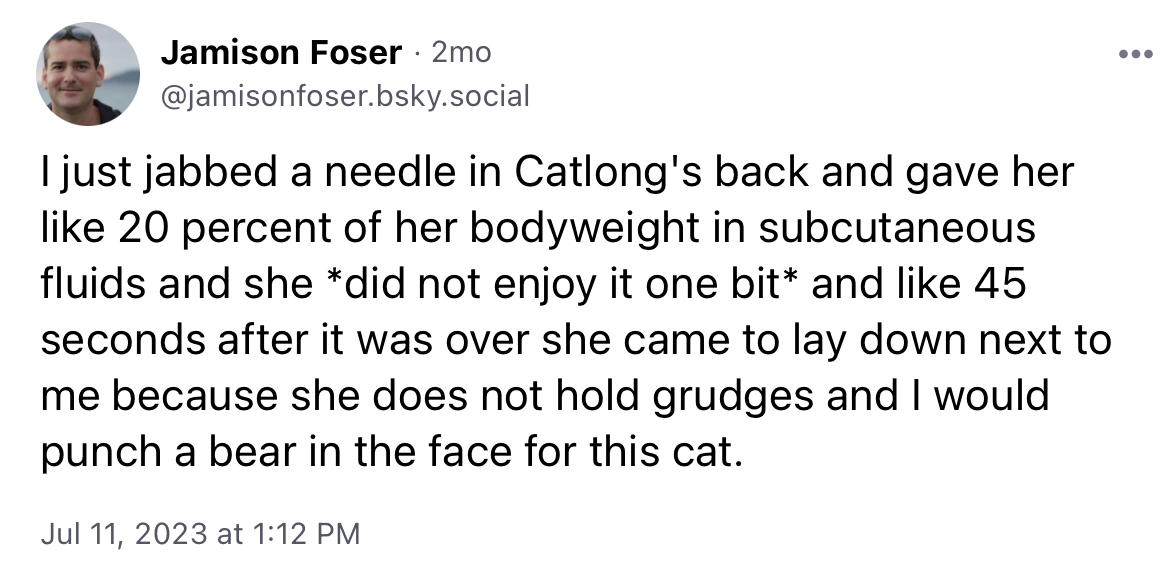
So, shocked and devastated, we began researching options and making plans. But Catlong wasn’t ready to leave us any more than we were to leave her. As we were looking into end-of-life options, she … got a lot better. By Sunday afternoon, we began thinking maybe this was all premature. By the time we talked to two more vets specializing in end-of-life care on Monday, we were sure. Catlong’s symptoms had receded; she was comfortable and playful. Not 100 percent, certainly, but not ready to leave, either. We knew we wouldn’t have much more time — but we had more.
And so we got about six more real good weeks together, the three of us. Six weeks of lap-sitting, chin-scratching, belly-rubbing. Six weeks of headbutts and gentle purring and Catlong putting her big paw on my hand, pulling me close. Six weeks of worry and of daily subcutaneous fluid injections, which she continued to *not enjoy one bit* — and continued to not hold against us one bit. Six weeks of working beside (or, more often, underneath) her in bed, where she seemed more comfortable. Six weeks of not taking a moment of it for granted, of enjoying every sandwich.
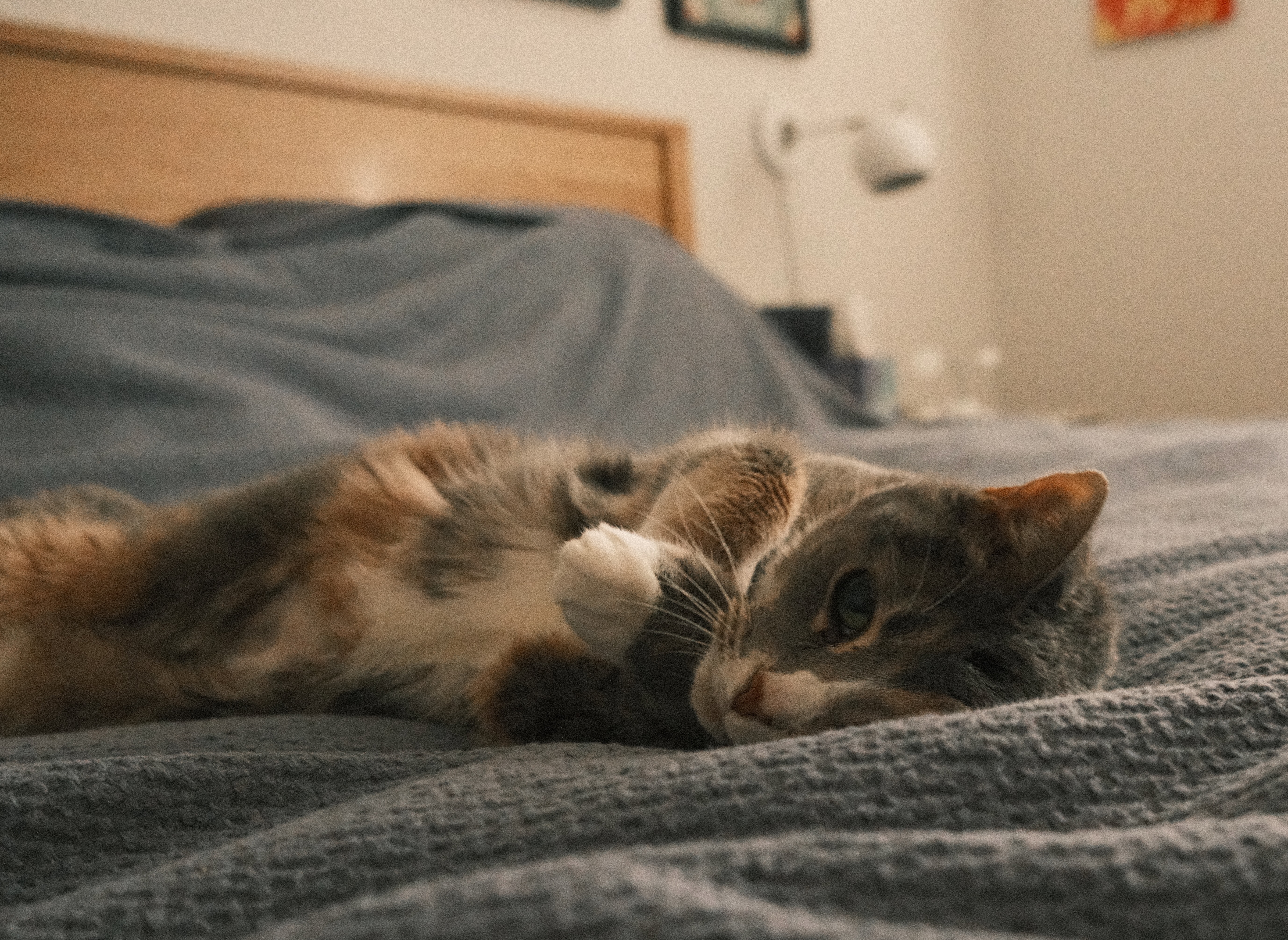
We’ll always be grateful for that extra time, that reprieve, those last few weeks. They are precious8 to us.
I’ll always miss the everyday rituals and companionship — the small things, not just the big ones. The playful headbutts we gave each other. Every morning when I’d put on a robe after showering, she’d hop up onto my shoulder to nuzzle my head while we walked to the kitchen for a cup of coffee. Every night when I finished brushing my teeth I’d open the bathroom door to find her sitting in the hall outside, waiting to escort me to bed, where she would sleep at (or on) my feet. And all the time in between, when she’d sit on my lap (or my keyboard) while I watched television (or tried to work) … or dramatically, insistently demand belly-rubs and chin scratches.
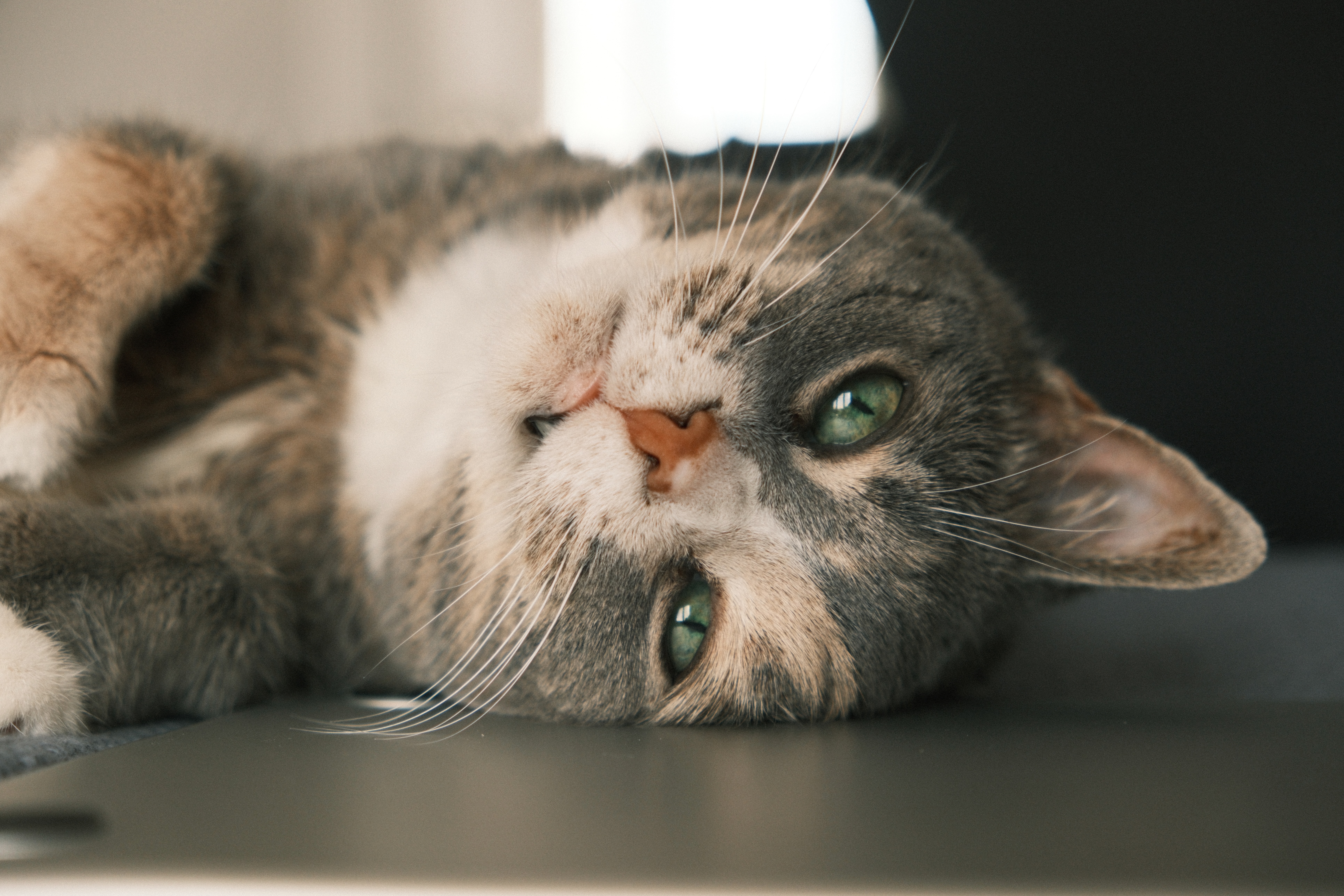
Catlong is everywhere. Her absence is everywhere. On the bed. The sofa. Atop the turntable, and the records — the one place she was not allowed to be, for fear she would (as she inevitably did one time) throw up on them.
The grief is constant. It is heavy. Suffocating. It’s always there and then suddenly it’s there more. I know all of this will fade. And that, too, is heartbreaking.
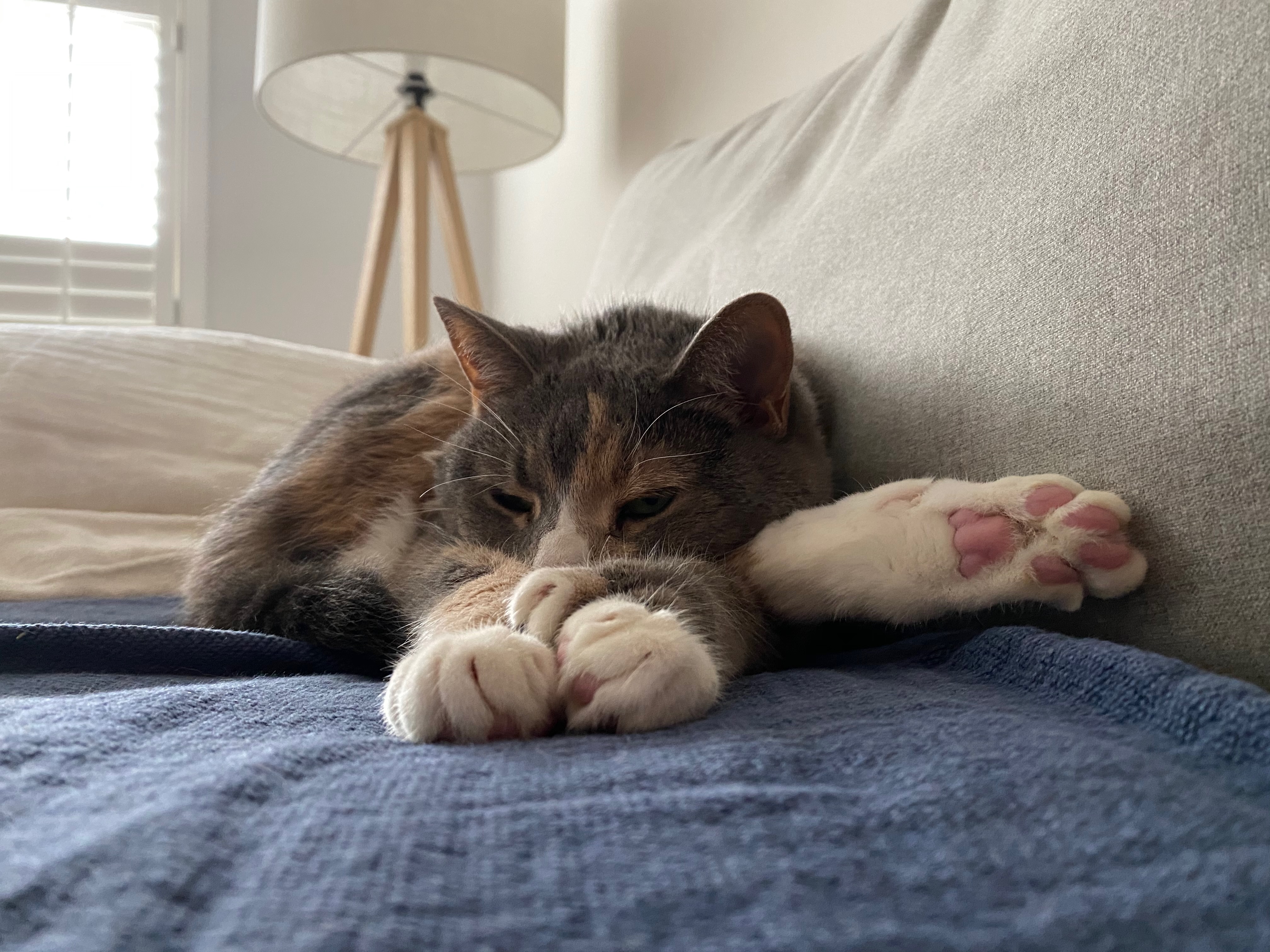
I can’t imagine it ever ending. Being happy and joyous and carefree, even for a moment. I can’t picture it, but I know it will happen. I know because that’s what Catlong spent 15 years teaching me: How to find simple pleasures and small joys — and the way out of the pit of despair.
And so this is the strongest endorsement for animal companionship I know how to offer: I am fucking miserable, and I will be for the foreseeable future, and the 15 years we had with Catlong outweigh that a thousand times over.
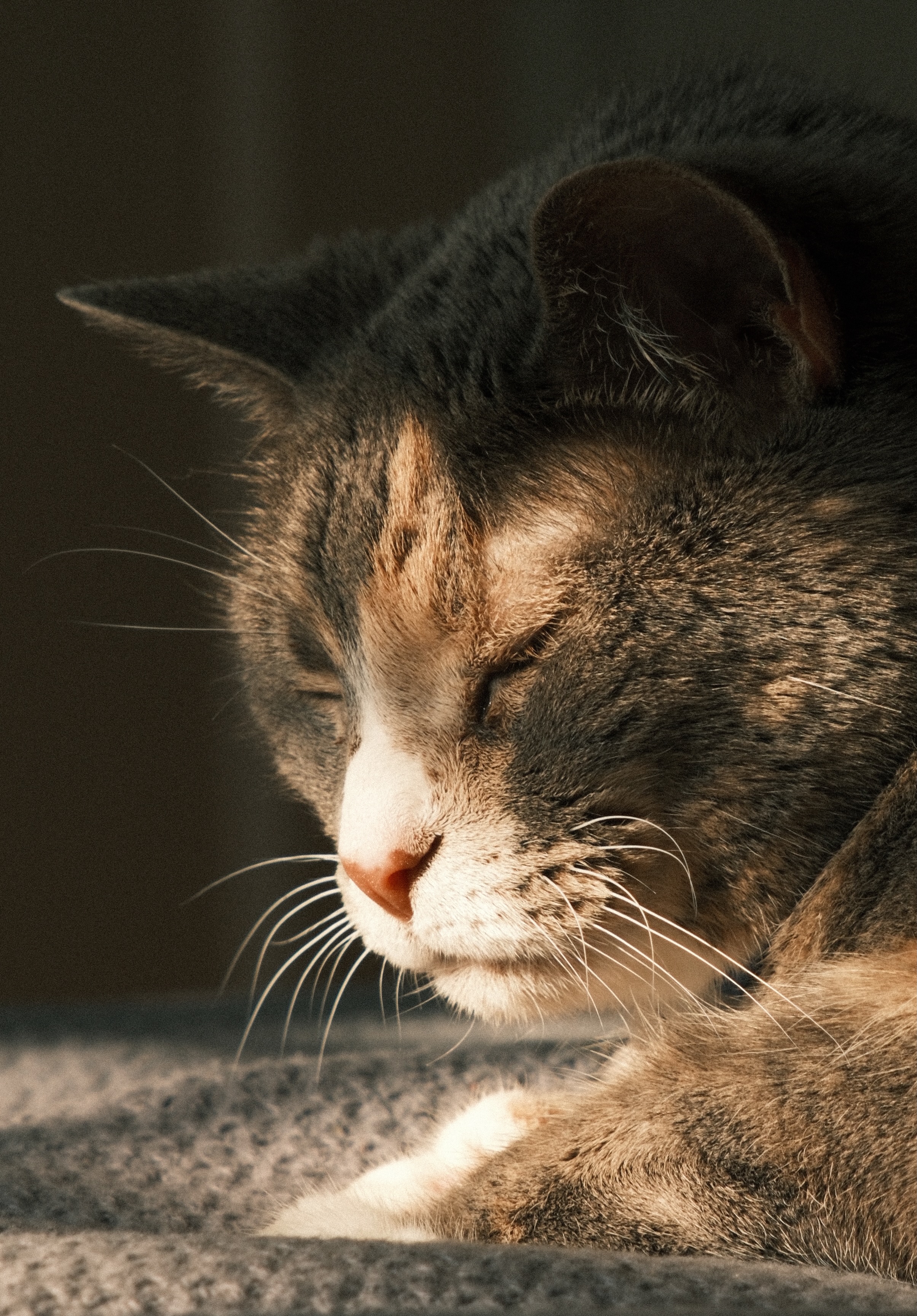
She was, after all, the one who wanted the cat. I’ve told this story a hundred times, easily, typically playing up the I’m-a-jackass-who-asked-his-partner-to-write-a-memo-about-getting-a-cat angle for laughs. The subtext, though — and the real point of the story — is: Thank you. That memo changed my life. ↩
No disrespect intended to any cats out there who are living their best life as a Precious, or to their human companions. But this cat wasn’t a Precious; this cat was Catlong. ↩
At least that’s how I remember it. ↩
In the song, Catlong is a boy. This does not matter, but I note it in order to discourage “well, actually…” replies, which will not be received kindly. ↩
Still very much a work in progress. ↩
I am not complaining. I chose this, more or less, and a lot of folks have things a lot harder. Still: it’s not always a positive thing to see a few seconds into the future. ↩
VERY much still a work in progress. ↩
Yep, I see it. I know. I swear it wasn’t intentional, but I’m leaving it. ↩
Member discussion